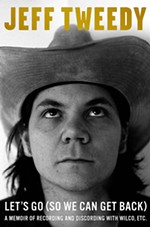Jenni Finlay Promotions Turns 8
From sleeping on pool tables at Cheatham Street Warehouse to radio
By William Harries Graham, 11:45AM, Wed. Aug. 20, 2014
Had she not become one of the most respected radio promoters in the business, Jenni Finlay might have been a horror movie critic. The local’s first campaign was James McMurtry’s Live in Aught-Three. “Everything I know about radio promotion, and most of what I know about the music business, I learning while working a McMurtry album,” confirms Finlay.
Two years later – 2006 – Jenni Finlay Promotions was born.
“The wonderful thing about radio is the community we share,” she says. “I’m talking to program directors around the nation that I’ve now known for over 10 years.”
Today, Finlay celebrates her eighth anniversary at the Gibson Showroom, starting at 6pm with an all star lineup: James McMurtry, my father Jon Dee Graham, Hal Ketchum, Rod Picott, Shelley King, Jess Klein, Owen Temple, Adam Carroll, Curtis McMurtry, and Matt Harlan.
Longtime friend Joan Kornblith, music correspondent at the Voice of America, calls Finlay a dynamo.
“She loves the music and that shows through in her personality and everything she does,” enthuses Kornblith. “She makes everything look so effortless and easy, even though we know it’s not."
Austin Chronicle: What’s the latest news from the Finlay camp?
Jenni Finlay: Recently, I expanded my business into management, which includes McMurtry and Jon Dee Graham. I’m also co-writing a book about my dad, Kent Finlay, owner of San Marcos’ renowned Cheatham Street Warehouse, with author Brian T. Atkinson. We’re co-producing an album, Cold & Bitter Tears: The Songs of Ted Hawkins, with Kevin Russell.
AC: Growing up, did you spend a lot time at Cheatham Street?
JF: When I was little, my parents were working all the time at Cheatham, making it happen. My brother Sterling and I would spend a lot of time there listening to George Strait and Stevie Ray Vaughan and Delbert McClinton. When we’d get sleepy, they’d turn off the light over a pool table, and we’d nap right there. They sold it when we started the family band, but dad bought it back in 2000 and I played my first original songs there when I would come home from going to college in Nashville at Belmont.
AC: You played fiddle for a long time in the family band. Tell me more.
JF: I played in the family band, Kent and Jenni Finlay, with my dad and brother from the time I was 8. I played the first three years of South by Southwest back when they listed all the bands on a back of the shirt, as well as the 1988 Democratic National Convention in Atlanta, and fairs and festivals across the Southwest. When you grow up on a farm, you naturally work the farm. When you grow up in a musical house, you naturally play music.
After supper, we’d have a choice of playing or washing dishes. I didn’t care much for washing dishes. When I got to college, I discovered that I was much better at the business side of things. I realized I’d rather shine a light on the artists that were much better than me than play myself.
AC: What do you like most about doing radio promotion?
JF: I love my radio family. Like us, the community of program directors and deejays are all serious about good music, and advocates of the hard working artists who are striving to be heard. We talk every week, send each other Christmas cards, and when we get together at the Americana and Folk Alliance Conventions or SXSW, it’s like a big old family reunion.
AC: How would you define Americana? And how do you define AAA radio?
JF: Americana is a broad spectrum of genres that spans blues to bluegrass. It’s the roots of American music. Triple A is closer to commercial rock – a bit more defined.
AC: What has changed most about the business for you?
JF: Technology. I started before text messages, Facebook, or Twitter. If McMurtry needed directions, he’d call me to look them up.
AC: How has social media changed what you do?
JF: It’s given me more ways to promote. I think it’s made it easier to illuminate my artists in a big way. I think eventually it’ll be a part of every promoter’s job description. I can’t wait to see what’s next.
AC: What would you say has changed most about doing radio promotion in the digital age?
JF: Sites like Airplay Direct allow radio stations all over the globe to instantly download albums. That cuts the expense of mail-out costs exponentially!
AC: What do you think makes an artist most attractive to radio?
JF: The song has to be great. It doesn’t matter how big your bus or belt buckle is or how pretty your packaging. If your songs don’t stand up on their own, radio won’t spin it.
AC: What makes this work the most pleasurable and a challenge?
JF: Working with people who work as hard as I do. I like to say that when it comes to the artist’s team, we all have to paddle to make the boat move. It doesn’t matter how hard I paddle my oar. If no one else is rowing, we’re only going to go in circles.
Every once in a great while, I accidentally take on a client who gives up. They’ve made a really great record, but become lethargic and not willing to tour behind it or do anything on their own to work it. That kind of thing is really disheartening and makes me want to thump them on the forehead.
But I love go-getters, the people who know what they want and go after it. As an artist, it’s really important to know exactly what everyone’s job is. It’s difficult when an artist thinks it’s the radio promoter’s job to book them at the Continental Club. It’s not.
A note to readers: Bold and uncensored, The Austin Chronicle has been Austin’s independent news source for over 40 years, expressing the community’s political and environmental concerns and supporting its active cultural scene. Now more than ever, we need your support to continue supplying Austin with independent, free press. If real news is important to you, please consider making a donation of $5, $10 or whatever you can afford, to help keep our journalism on stands.
Doug Freeman, March 19, 2017
Kevin Curtin, May 5, 2016
Dec. 21, 2018
Dec. 22, 2017
Jenni Finlay, James McMurtry, Curtis McMurtry, Jon Dee Graham, Hal Ketchum, Rod Picot, Shelley King, Jess Klein, Adam Carroll, Owen Temple, Matt Harlan, Stevie Ray Vaughan, Delbert McClinton, George Strait, Kent Finlay, Cheatham Street Warehouse









